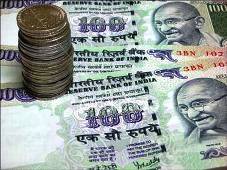 The overall inflation in March eased to 6.89 per cent on account of sharp decline in prices of onions, fruits and protein-based items, even as vegetables and pulses turned costlier.
The overall inflation in March eased to 6.89 per cent on account of sharp decline in prices of onions, fruits and protein-based items, even as vegetables and pulses turned costlier.
Inflation, as measured by the Wholesale Price Index, was 6.95 per cent in February. In March last year, it was 9.68 per cent.
As per the official data released on Monday, inflation in food items was 9.94 per cent in March, as against 6.07 per cent in February.
Onion prices declined by (-)24.23 per cent in March. The rate of decline was (-)48.50 per cent in February.
Besides, eggs, meat and fish prices rose 17.71 per cent during the month, lower from 20 per cent in February.
Pulses turned expensive by 10.05 per cent and vegetables by 30.57 per cent during March. In February, the rate of price rise in vegetables was 1.52 per cent.
Milk became expensive by 15.29 per cent, while rice and cereals turned costlier by 4.73 per cent and 4.41 per cent respectively. Prices of potato too rose by 11.60 per cent.
Food articles have 14.3 per cent share in the WPI basket.
The manufactured goods showed moderation in inflation to 4.87 per cent, from 5.75 per cent.
This may have a bearing on the annual monetary policy to be announced by the Reserve bank on Tuesday.
The inflation number for March remained marginally above the projections made by Finance Ministry, which had expected it to be around 6.5
The headline inflation number for January was revised upwards to 6.89 per cent, up from the provisional estimate of 6.55 per cent. Inflation in overall primary articles rose sharply to 9.62 per cent in March, from 6.28 per cent in February.
In manufactured items, it has been high since February 2011, when it crossed the 6 per cent mark.
Year-on-year, among manufactured items, iron grew dearer by 17.18 per cent and edible oil prices rose by 9.78 per cent.
Inflation in tobacco products and basic metals was 8.22 per cent and 9.51 per cent respectively.
Non-food primary articles, which include fibres and oilseeds, was however lower at (-) 1.20 per cent in March.
In February, it was (-)2.56 per cent.
Inflation in the fuel and power segment was 10.41 per cent on an annual basis. The rate of price rise was 12.83 per cent in the previous month.
Experts said the inflationary pressure, driven by prices of food articles, will keep the pressure on the government to remove supply side bottlenecks.
Headline inflation was near double digit for most of 2010 and 2011.
The apex bank hiked key policy rates 13 times, totalling 350 basis points between March 2010 and October 2011 to tame inflation.
Since January, RBI has resorted to injecting liquidity into the financial system, by reducing Cash Reserve Ratio for banks.
Besides, it has called for fiscal steps by the government to combat inflation.








